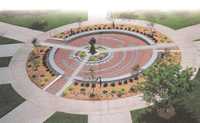
Ursa S. Harriell-Taylor
is honored with a Brick from Lillian Christine Taylor and Mary Catherine Taylor.
Mom, the movie star, is sunbathing in the back yard. The smells of baby oil and iced tea with lemon hang in the air. Tom Jones is singing something sexy, and my sister and I are playing in the sand pile with the dog, Sabrina. There is the sound of bugs chirping and Mom's travel alarm clock ticking in the heavy summer air. It was a compact thing, a clock perfect for throwing in a suitcase as you ran out the door to the limo, heading for location shooting in Italy or Brazil.
Mom, the movie star. We always saw her that way. She never went anywhere without lipstick, sunglasses and a scarf. So poised and beautiful, she would advise us, "Always have a navy blue, tan and black suit in your closet and never, never wear white shoes." Seemed like good advice to me.
The travel alarm would buzz and off she'd go to fix dinner or can more vegetables from the garden. My sister and I would sit in wonder. We wondered why Mom couldn't just stay outside with us forever. But, there was stuff to do, stuff we didn't think Mom ought to be doing. We wanted Mom to learn to drive and take us for a ride in the sleek convertible we would buy for her with our allowance. A movie star shouldn't be doing laundry or cooking dinner.
Now, when my sister and I get together and reminisce about Mom, we not only remember the woman who looked like a movie star, we remember her creativity, her passion. We remember what she gave us that we are so thankful for now. We remember her intense love for the arts, for music and film, the love that she passed on to us. We remember her passion for what is right and just, her romanticism. She seemed to always be saying, "Girls, these are the things that are important."
She took us to any movie we wanted to see, no matter what the rating. She wanted us to be exposed to the world, to art. There were no restrictions in our house regarding what was acceptable for children to read. Our childhood summers were filled with riding our bikes to the library (sometimes everyday) to check out an endless number of books on whatever subject we happened to discover. We remember hot summer days filled with novels, history, poetry and music.
Mother was in her 40's when she had my younger sister and I. We've often thought that her age made a huge difference in all the things we learned from her. She was from a very different generation than most of our friends' parents. We were learning to appreciate jazz, big band music and the films of Joan Crawford and Bette Davis while our friends were listening to the Bee Gees. I have to say, I'm rather proud of that, even though it didn't always mean that I fit in with my peers.
It was the 70's and when I discovered feminism, Mom was more than happy to take us to the "Free To Be" bookstore. It was a new thing for Wichita, a new thing for me. I was an adolescent and discovering. She didn't have a clue about "Women's Lib" or activism and neither did I. I wanted to know and Mom wanted to make sure that I found out what I wanted to know. We remember her indignation when the credit card company would not issue a card to her in her own name, only our father's. She knew what feminism was about and I know she wanted to make sure life was different for my sister and me. When Mom died, my sister was twelve and I sixteen. We often speculate on the changes that would have occurred had she lived. We often wonder what she would think now, what she would do. How would she see us? We think she would be as passionate and romantic as ever. We think she would be proud of us, of who we are, as we are proud of her and all the things she gave us.
Submitted by Lillian Christine Taylor and Mary Catherine Taylor
September 16, 1998 (for Ursa S. Harriell-Taylor)










